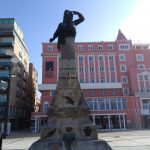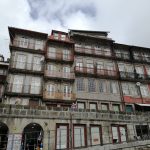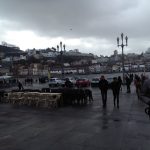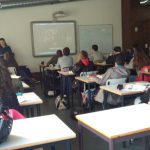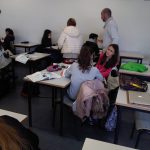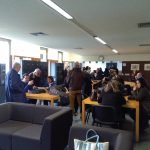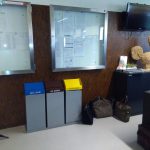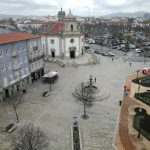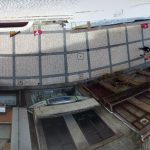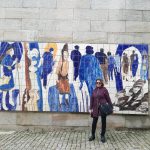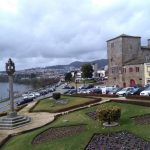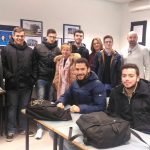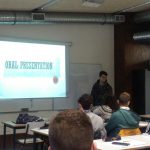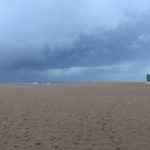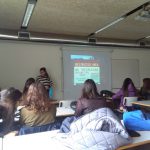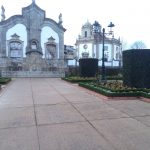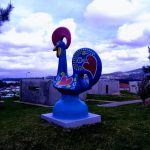Barcelos, 11 marzo 2018 – 17 marzo 2018
(Partecipanti: Antonio Poto, Frida Mega, Lauretana Paladini, Paolo Mangia)
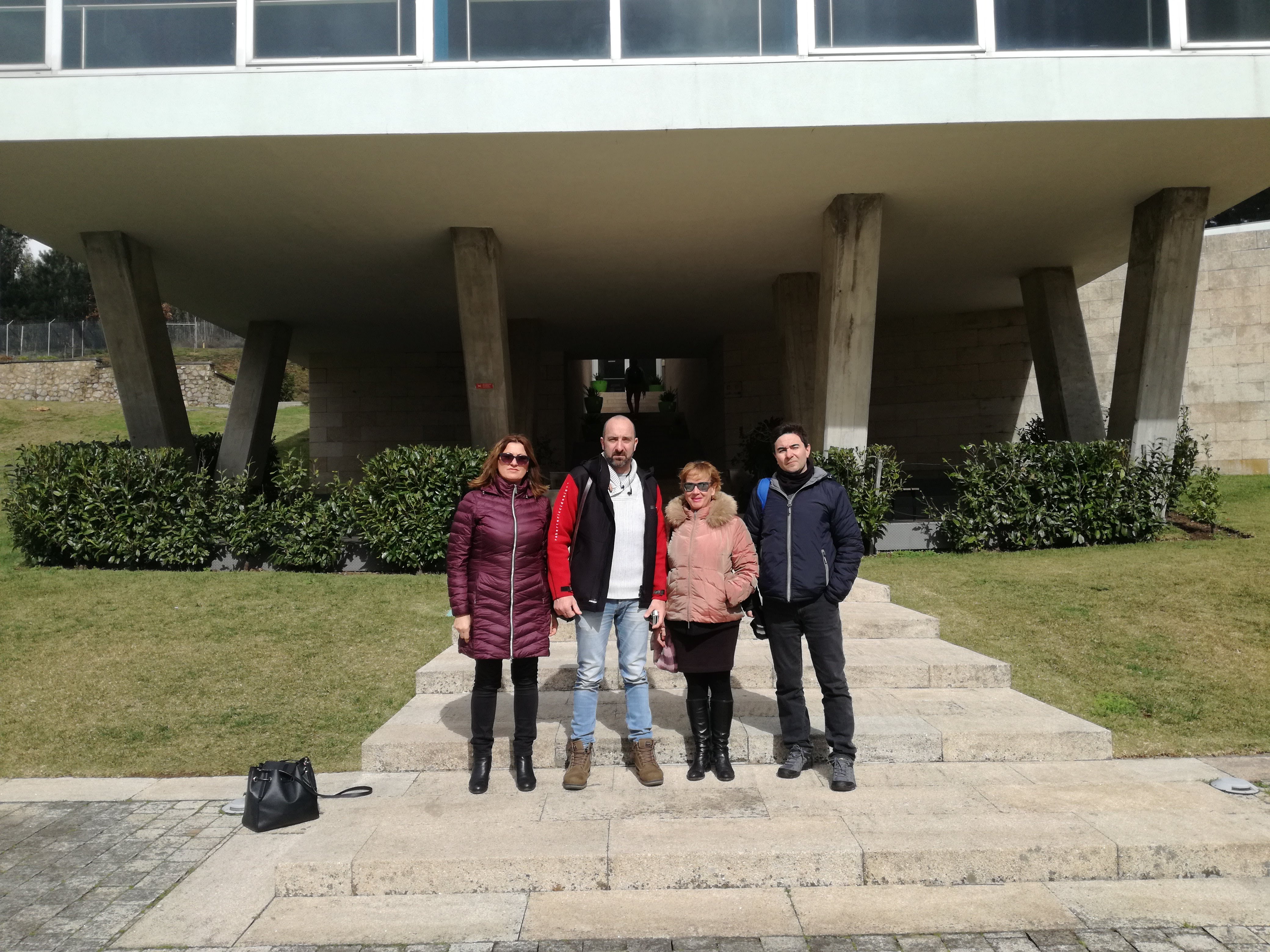
Course program
 |
The programme of visit and internship
Erasmus + Project |
| Project title: ERASMUS+ KA1 – FOR SCHOOL STAFF in Portugal Number: Group B Duration time: 1 week (10/03/2018 – 18/03/2018) |
|
| Day 1 | • Departure • arrival to Portugal • transit to Pòvoa De Varzim • dinner |
| Day 2 | • breakfast • excursion to Porto • dinner |
| Day 3 | • 7.30 – 8.30 – breakfast • 9:00 – beginning of the visit in “Escola Secundaria Alcaides de Faria”; greeting of beneficiaries by the Headmaster of the School, introduction participants to teaching base and meeting with employees of the institution • 10.30 – 12.00 – job shadowing activities • 14.00 – 16.00 – discussion panel about educational system in Portugal • 16.00 – 18.00 – free time • 19.00 – dinner |
| Day 4 | • 7. 30 – 8.30 – breakfast • 9:00 – 12.30 – job shadowing in Escola Secundaria Alcaides de Faria • 12.30 – 14.00 lunch break • 14.00 – 17.00 – visit at Escola ETG in Barcelos – greeting of beneficiaries by the Headmaster of the School, introduction participants to teaching base and meeting with employees of the institution • 17.00 – 19.00 free time • 19.00 dinner |
| Day 5 | • 7.30 – 8.30 – breakfast • 9.00 – 12.00 – job shadowing in Escola Secundaria Alcaides de Faria • 14.00 – 17.00 – meeting with Education Superintendent of Camara Municipal Esposende. Conversation about the number of institutions offering education in secondary schools in the area, introduce of participants with statistics and share with them the experience; • granting of information about existing programme base in secondary schools, work programmes with an emphasis on programs written by teachers; • 17.00 – 19.30 – free time |
| Day 6 | • 7.30 – 8.30 – breakfast • 9.00 – 12.30 job shadowing in Escola Secundaria Alcaides de Faria • 12.30 – 13.30 – lunch • 14.00 – 17.00 – Visit at Agrupamento de Escolas Gonçalo Nunes • 17.00 – free time • 19.00 dinner |
| Day 7 | • 7.30 – 8.30 – breakfast • 9.00 –12.30 – job shadowing in Escola Secundaria Alcaides de Faria • 14.00 – 17.00 – summary of the project, a multimedia presentation receiving certificates • Free time |
| Day 8 | • Study Visit and field project cultural activity: visit to the main historical places of the Portuguese Heritage |
Scarica tabella delle attività (activities timetable)
Riflessioni sull’esperienza e diario di bordo

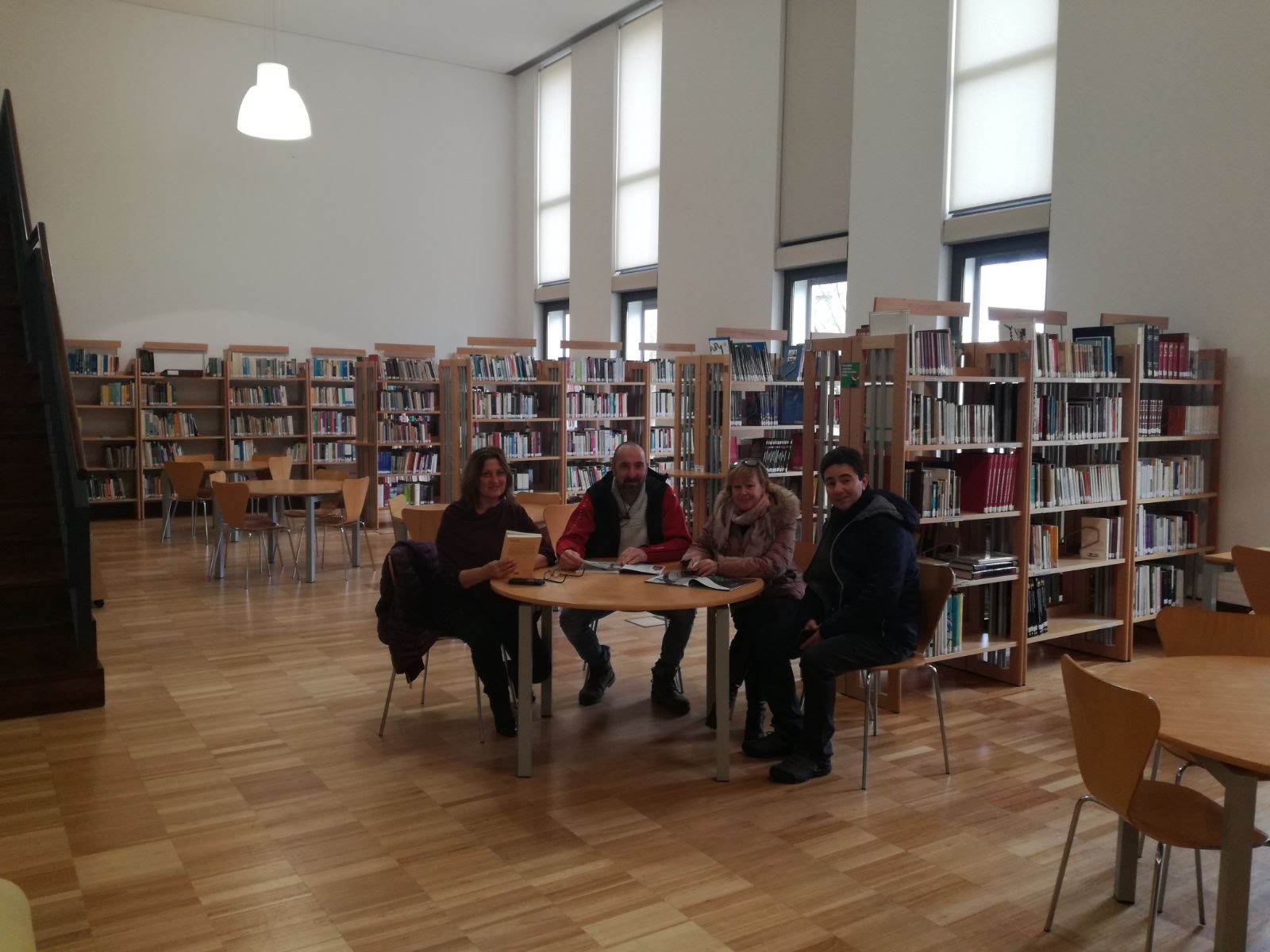
Questa nostra esperienza in Portogallo, chiude il flusso di mobilità Erasmus + KA1 per noi docenti gruppo B. Quest’ultima tappa ci ha visto coinvolti in attività di Job shadowing in Barcelos, ma ci ha permesso di interagire con le specificità della terra, della cultura e della società portoghese, aspetti dei quali nessuno di noi era a conoscenza.
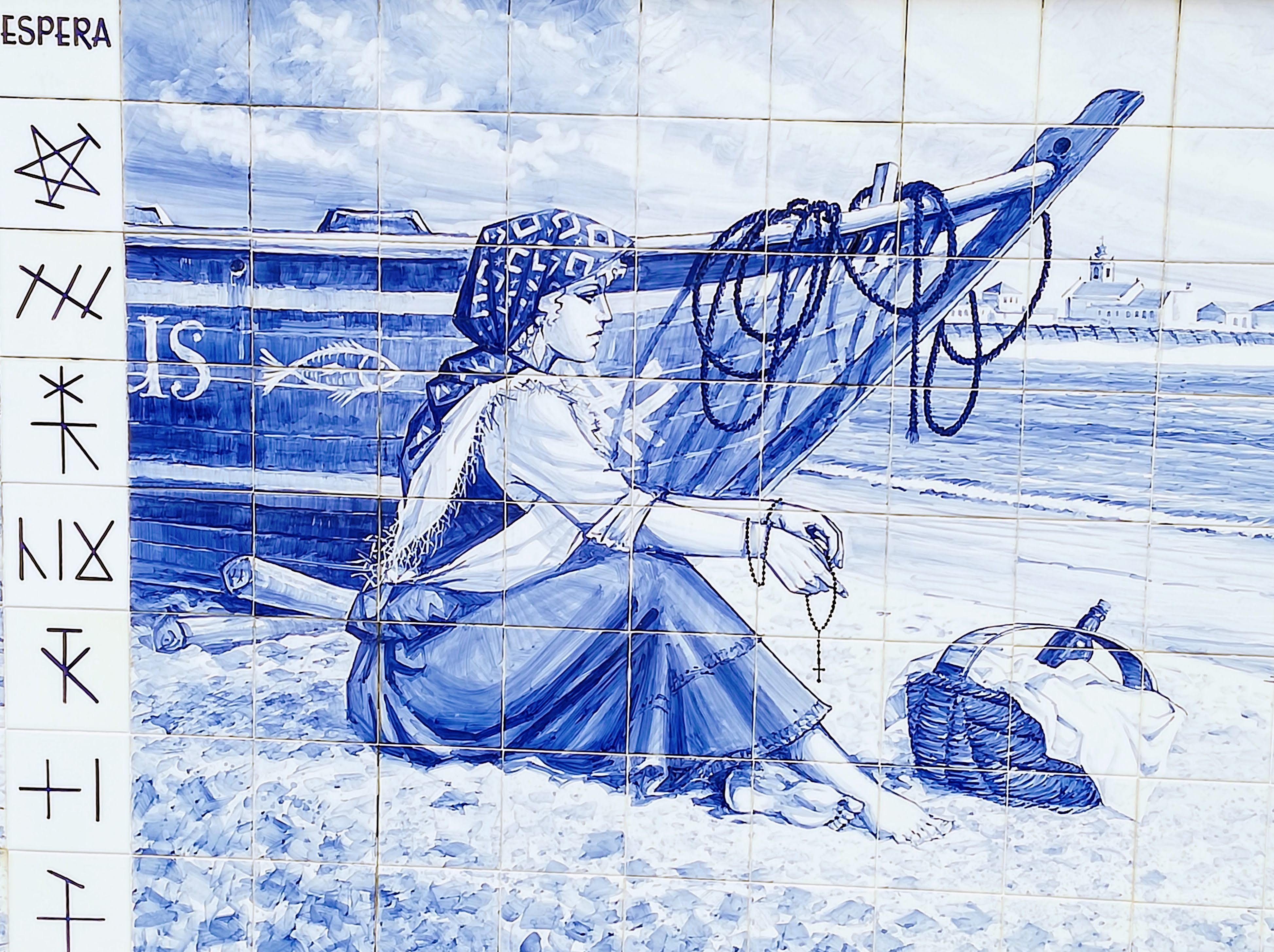
- dav
- dav
Sabato 10 Marzo:
Dopo un estenuante viaggio, con scalo prima all’aeroporto londinese Stansted e dopo a quello di Porto, per altri 39 Km in auto, intorno alle 21, si giunge finalmente in Hotel Luso Brasileiro a Póvoa de Varzim accompagnati dai responsabili dell’Intercultural Association Mobility Friends. Il tempo non è dei migliori, piove e le raffiche di vento ci danno il benvenuto.
Domenica 11 Marzo:
Inizia l’avventura, studio e osservazione. Colazione in hotel, passeggiata mattutina sul lungomare di Póvoa de Varzim, giusto per fare confidenza con un mare tempestoso in una terra, il Portogallo, baluardo sull’Atlantico. Qualche meritata rinfrescata non solo alle tempie ma persino sui pantaloni per l’incontrollabile moto delle onde, fugata e via per la partenza in pullman, escursione a Porto. In compagnia di una scolaresca rumena, ragazzi di scuola secondaria di 2^grado, e altri colleghi ed operatori culturali dell’Association Mobility Friends abbiamo intrapreso il percorso sotto un cielo plumbeo e repentine piogge. Il grigiore del tempo non ha ottenebrato la semplicità e il calore della gente portoghese. La ricchezza di questi luoghi proviene dal mare, il quale restituisce pluralità di genti e trame sociali, le stesse che ritroviamo nelle vie, nella miriade di volti tessuti sulle trame delle decorazioni delle piastrelle dipinte “azulejos” che arricchiscono gli esterni e gli interni di palazzi semplici e lineari, di chiese millenarie romaniche e barocche istoriate ad un indelebile blu colore del cielo e del mare. L’immenso fiume Douro separa la città di Porto, sulle cui rive trionfano antiche distillerie, spazi ricchi della produzione dell’omonimo vino, imponenti e maestosi ferry boat memori di importanti commerci. Segni metallici fendono lo spazio che sovrasta il fiume in linee curve e rette, firme di uno sviluppo moderno consegnato da abili ingegneri; protesi, sospesi e maestosi i ponti del XVIII e XIX sec. collegano le due rive attraversati in ogni attimo da ogni forma di trasporto e dalla pluralità umana. Città dinamica, semplice e variegata che conserva il suo fascino antico e la sua semplicità, Porto ci è rimasta nell’animo! Insieme ai pensieri, nel tardo pomeriggio si fa rientro a Póvoa de Varzim, sul lungomare sotto il busto in bronzo del marinaio eroe “Ceco Do Maio” che con la mano sinistra sulla fronte scruta il mare tempestoso e inquieto.
- dav
Lunedì 12 Marzo:
Dopo una frizzante passeggiata sul lungomare di Póvoa de Varzim si parte con lo staff del nostro host partner, Associacao Intercultural Amigos Da Mobilidade per la città di Barçelos. In mattinata partecipiamo ad attività di job shadowing presso la scuola “Escola Secundaria de Faria”, nel pomeriggio visitiamo il centro storico di Barçelos. L’ingresso della scuola risulta essere il nostro meeting point, entrati a scuola notiamo che oltre al personale scolastico anche i ragazzi dispongono di un badge con il quale si apprestano ad accedere all’Istituto, simultaneamente su un monitor all’ingresso appaiono le loro generalità, volti e dati anagrafici degli alunni presenti che entrano a scuola. Pensiamo che questo modo permetta ai docenti di non fare l’appello recuperando maggiore tempo per la didattica.La struttura scolastica si presenta moderna, funzionale e nuova: gli interni ampi e confortevoli dotati di numerosissimi spazi funzionali, laboratori, spazi sportivi e ricreativi, ampie sale arredate con strumenti per le varie attività di formazione, lavoro e svago. Le scuole all’esterno sono ben curate negli spazi verdi e negli arredi e permettono a chiunque di sentirsi sicuro e protetto.Gli alunni sono autonomi, liberi e responsabili, il clima che si respira è piacevole, rilassante e confortevole. Entrati nell’Istituto i colleghi portoghesi ci danno il benvenuto, ci accolgono all’interno di una confortevole sala per docenti con bar e ampi divani, ci offrono un caffè e ci invitano ad assistere alle loro lezioni in lingua inglese, alcune della durata di un’ora altre di due. L’aula a noi assegnata è la n°19, gli alunni attendono nel silenzio l’arrivo del docente il quale dispone della propria aula ben attrezzata, arredata (computer, proiettore, LIM), illuminata e completamente insonorizzata (tutte le aule hanno questi notevoli comfort); notiamo la compostezza degli alunni e la loro partecipazione attiva. La didattica risulta essere stimolante ed efficiente, la lingua parlata è l’inglese tranne che per qualche eccezione si ricorre al portoghese, per rafforzare l’espressività nella comunicazione o per chiarire qualche concetto. I ragazzi partecipano in modo autonomo e responsabile, il lavoro dei docenti è svolto tranquillamente e gli alunni manifestano nelle diverse attività assegnate un grande senso di rispetto e consapevolezza nel ruolo che esercitano.
Alla fine dell’attività di Job Shadowing insieme a Giovanni, nostra guida di origine spagnola, ci rechiamo a visitare la città di Barçelos, appena rifocillati in un piccolo e carinissimo pub del luogo esploriamo la città ospitante dove ammiriamo ogni prodotto locale: dall’artigianato artistico ai manufatti edili civili e religiosi, alla storia, alla sua cultura e tradizioni, alla cura dei parchi e dei giardini. Ai nostri occhi Barçelos ha qualcosa in comune con le nostre terre, si respira un’aria mediterranea e familiare; il ragazzo Giovanni simpaticissimo, ci trasmette tutto il suo calore e la sua simpatia al contrario di quanto abbiamo percepito nella “distante” e nella “fredda” Finlandia. Ritrovato il calore mediterraneo, sulle impronte della nostra mascotte il “Galletto portafortuna” memore di millenarie colonizzazioni, sotto un cielo minaccioso di pioggia si rientra a Póvoa de Varzim. Scampati alla pioggia, qui abbiamo più tempo per cercare, scoprire e confermare ciò che ci accomuna a questa terra, la nostra mediterraneità. Vicoli, case, chiese, palazzi antichi e decori sottolineano quanto già percepito a Barçelos e a Porto, una terra generosa e a volte avversa che ha forgiato animi e segnato volti in ognuno dei quali si rivela il duro lavoro che ha permesso il riscatto dalla brutalità e dalle avversità di una natura a volte anche incontrollabile.
Una società quella portoghese nella quale il concetto del lavoro è sempre molto alto e forte, un lavoro corale nel quale la società tutta si ritrova, ognuno è consapevole del proprio ruolo all’interno del quale opera e riconosce il valore della difesa dei diritti propri e degli interessi collettivi. I lavoratori portoghesi sono più soddisfatti negli ultimi due anni del loro sistema politico e sociale basati sull’uguaglianza, la condivisione e la cooperazione, le risorse economiche risultano essere equamente distribuite tra la popolazione, e al lavoro partecipano tutti, si parla di piccolo miracolo economico in Portogallo così come riscontrato su alcuni giornali negli ultimi due anni: “Adesso il Portogallo va molto bene, con crescita del 2,6 per cento, calo del debito, deficit all’1,7 per cento e disoccupazione all’8,5. Eppure fino e ieri era uno dei grandi malati d’Europa. Una cura da cavallo, assecondata nella seconda fase da un governo di sinistra dura, ha centrato l’obiettivo…” oppure “Da un’economia disastrata, in pochi anni un governo di sinistra-estrema sinistra, con un colpo al cerchio della sua base elettorale e uno alla botte dei rigoristi di Francoforte e Bruxelles, ha portato il paese fuori dall’area a rischio” o ancora l’articolo di Vittoria Patanè del 9 gennaio 2018: “Portogallo: miracolo economico o paradiso fiscale dei pensionati? Dalla Troika alla crescita solida, dalla crisi più nera a Paese simbolo di riforme, robustezza e stabilità. Il tutto in soli due anni. La favola del Portogallo continua ad attirare l’interesse internazionale… la ripresa del Portogallo viene considerata un piccolo miracolo economico operato dal premier socialista Antonio Costa, arrivato al potere alla fine del 2015, e dal suo governo di sinistra, visto come un vero e proprio unicum nel panorama europeo.”
La realtà portoghese ha saputo coniugare storia, tradizione, cambiamento, crescita e diritti sociali per tutti, al contrario del sistema italiano che è rimasto fossilizzato sul concetto di austerità imposta da Bruxelles mentre la corruzione e la burocrazia ingessano il funzionamento delle stesse Istituzioni. Proprio in questi giorni, nelle strade e nelle scuole portoghesi, si assiste ad un’intensa attività sindacale con cui si richiede l’adeguamento dello stipendio, molto basso rispetto al resto d’Europa; qui infatti un docente percepisce meno di mille euro al mese, ma in rapporto al loro e al nostro caro vita tutto diventa relativo e non a caso molti pensionati italiani scelgono il Portogallo come méta dei propri sogni.
- dav
Martedì 13 Marzo:
In mattinata si ritorna a Barçelos presso la “Escola Secundaria Alçaides de Faria”, i colleghi portoghesi simpatici, gioviali e ospitali ci accolgono nella loro meravigliosa struttura scolastica, ci offrono il caffè e pasticcini, facendoci sentire a casa. Visitiamo l’intera struttura scolastica e siamo invitati ad assistere a delle lezioni tenute nelle aule n°20 e n°26, terminate le lezioni ci spostiamo per un lunch break nel centro di Barçelos e poi proseguiamo insieme a Giovanni in pullman verso la periferia di Barçelos in un’altra scuola “Escola ETG”.
All’interno della “Escola ETG” siamo accolti dal Preside, il quale ci fornisce delle informazioni sul sistema educativo e sociale portoghese. Il Preside è accompagnato da una docente sindacalista e responsabile dei Fondi Comunitari gestiti dalla scuola, la collega ci fornisce ulteriori spiegazioni sulla funzione della struttura ospitante e i finanziamenti che loro ricevono dalla Comunità Europea.
Il sistema scolastico portoghese è costituito dall’insegnamento prescolastico, quello scolastico e l’educaçao o extra-escolar. L’insegnamento prescolastico non è obbligatorio ed è riservato ai bambini da 3-6 anni. L’insegnamento scolastico copre l’ensimo basico (l’insegnamento elementare), esso è universale ed obbligatorio e comporta 3 cicli sequenziali di un totale di 9 anni dai (6 ai 15 anni). L’ensimo secondario è organizzato in due settori, corsi prevalentemente orientati al prosieguo degli studi (CSPOEPE) o corsi generali. I corsi della scuola secondaria hanno una durata di 3 anni dai (15-18).
La scuola ETG è una scuola secondaria, un professionale tecnologico che si rivolge ai ragazzi dai 15 ai 18 anni che vivono con le proprie famiglie in quest’area periferica della città di Barçelos; l’Istituto è stato realizzato interamente con Fondi comunitari europei, i costi individuali (spese per trasporto, libri, mense, cure sanitarie in genere, sport, svago, ecc. ecc.) sostenuti nel periodo di formazione sono interamente gratuiti, ciò per garantire il diritto all’educazione e all’apprendimento dei ragazzi residenti nell’area, i quali provengono da famiglie che non dispongono di molte risorse. Tutti i ragazzi, completati gli studi, sono collocati nei diversi settori produttivi per i quali si sono formati: tecnologico, manifatturiero, arte design etc… acquisendo anche autonomia economica rispetto alle famiglie d’origine. La formazione di questa scuola è tecnica, professionale e tesa a rendere autonomo il ragazzo, ad insegnargli un mestiere che possa realizzare e mettere in pratica subito dopo l’apprendimento. All’interno, la scuola presenta ampi e attrezzati laboratori polifunzionali per le numerose attività formative, ludiche e ricreative, una realtà scolastica che anche noi vorremmo avere.
Dopo una giornata piena e intensa di assistenza alla didattica e visita presso i vari laboratori della scuola portoghese, nel suo complesso eccellente e funzionale, si torna tra le piastrelle colorate “azulejos” che riparano dal vento forte e dalla brezza marina le facciate di architetture umili e modeste di Póvoa de Varzim, in cerca di qualche ricovero culinario ricco di pietanze tipiche e succulente.
- dav
- dav
Mercoledì 14 Marzo:
Quinto giorno di attività di Job Shadowing a Barçelos sempre presso la Escola Secundaria Alcaides de Faria, con studenti più grandi di formazione liceale; notiamo che la nostra presenza non disturba affatto gli studenti portoghesi, i quali sempre corretti e mai distratti affrontano i dialoghi e le verifiche con i loro docenti, come se fossero abituati sempre ad avere spettatori o interlocutori durante le proprie lezioni. La metodologia didattica dei colleghi portoghesi è simile a quella nostra italiana, l’unica differenza è lo spazio fisico e la qualità dell’ambiente in cui si svolge l’attività educativa, un luogo che gratifica la persona, la rende libera e la fa sentire a proprio agio. Una scuola più bella della propria casa, dove volentieri ognuno ritrova il piacere di vivere e spendere il proprio tempo. Questa è la differenza: un ambiente a misura d’uomo, confortevole, che genera armonia e serenità in chi lo vive e in chi lo condivide, proprio questo abbiamo constatato, a malincuore, ciò che a noi manca.
Dopo una brevissima pausa pranzo ci rechiamo a Esposende dove incontriamo la Sovrintendente all’Educazione del Comune di Esposende. Cordiali e accoglienti le Autorità della Camara Municipal di Esposende ci descrivono l’economia del loro paese, il numero delle Istituzioni presenti sul territorio impegnate nell’educazione e nella formazione scolastica; la Biblioteca comunale mette a disposizione dei cittadini ogni spazio e servizio, osserviamo alcuni ragazzi in età prescolastica 3/6 anni che lavorano autonomamente e si presentano ai nostri occhi silenziosi e rispettosi mentre svolgono i diversi compiti, i loro gesti ineccepibili al nostro sguardo. Molti sono gli spazi recuperati con i fondi comunitari, dalle antiche dimore ai pubblici spazi, nel rispetto dei tempi e dei materiali; un sistema sociale giusto ed uguale che manifesta efficienza e garantisce i diritti ai propri cittadini i quali manifestano responsabilità e alto senso civico; cercando affinità con il nostro sistema proviamo qualche difficoltà, si rientra in hotel a prendere appunti e qualche nota dolente. Allettati dai sapori e dai profumi del mare, trastullati dallo sciabordio delle onde e dal fischio del vento si cerca un locale dove cenare.
- dav
Giovedì 15 Marzo:
Sesto giorno di attività di Job Shadowing a Barçelos sempre presso la Escola Secundaria Alcaides de Faria, sempre come al primo giorno, mai una piega fuori posto, le prime impressioni sono quelle che contano: compostezza dei ragazzi, autonomia, interesse e partecipazione nello studio, un ambiente bello al quale non pensiamo di poterci sottrarre, lo condividiamo e ne riconosciamo ogni virtù.
Nel pomeriggio visita autonoma nei palazzi pubblici e nei musei principali della città di Barçelos, tra le mura storiche della città, le chiese, e il principale mercato settimanale dove si possono riscontrare la semplicità della gente legata alla propria terra ai propri prodotti e alla genuinità di chi la difende e la ama. Nella miriade di forme al mercato ritrovo la ricchezza popolare dipinta sulla terracotta e una smania a registrare puzzle colorati sul mio cellulare.
- dav
- dav
- dav
Venerdì 16 Marzo:
L’attività didattica odierna è sospesa a causa dello sciopero degli insegnanti, i quali chiedono un adeguamento dello stipendio. Rimaniamo a Barçelos, ci spostiamo in periferia sulla parte più alta del luogo presso la sede di Intercultural Association Mobility Friends, l’associazione che ci ha seguito durante questo percorso in Portogallo, abbiamo conosciuto le autorità del luogo e il responsabile del Campus. Un progetto multimediale ha coinvolto tutti i partecipanti e a conclusione dei lavori abbiamo ricevuto gli onori dei referenti e l’attestato di partecipazione al progetto. Verso sera si rientra in hotel.
Sabato 17 Marzo: Visita autonoma di studio nei luoghi dell’arte, della storia e della tradizione portoghesi. Musei e mostre d’arte a Povoa de Varzim, palazzi pubblici e comunali. Visita di studio ed escursione autonoma a Porto.

Considerations about the experience and logbook – Job Shadowing in Portugal 10-18/03/2018.
This last experience in Portugal closes Erasmus + KA1 mobility flow for us, teachers of group B. Last stage has involved us in job shadowing activities in Barçelos and it gave us the opportunity to interact with Portuguese culture and society, aspects of which none of us knew.
Sunday 11 March
The learning adventure begin: observation and studying. After breakfast at the hotel, we went for a walk on the promenade of Póvoa de Varzim just to meet the rough sea in a land, Portugal, that is a bastion over the Atlantic. Oceanic tide was unknown and unpredictable and suddenly we ran to escape a giant wave!
A bus came to pick us for a trip to Porto. With a Romanian high school group, some teachers and cultural operators from Association Mobility Friends we
We walked under a leaden sky and sudden rains, but greyness of the weather did not obscure the simplicity and warmth of Portuguese people. Richness of these places comes from the sea which brings back the plurality of populatiomn and social texture, the same that we find in streets, in the myriad of faces woven on colourful azulejos tiles that enrich the exteriors and interiors of simple and linear palaces of ancient Romanesque and baroque churches, with an indelible blue ski and sea shades. The immense river Douro separates the city of Porto, on whose banks triumph ancient distilleries, rich spaces of the production of the homonymous wine, impressive and majestic ferry boats reminiscent of important trades. Metal signs cleave the space above the river in curved and straight lines, signatures of a modern development delivered by skilled engineers; stretched, suspended and majestic bridges of the eighteenth and nineteenth centuries connect the two banks crossed every moment by every form of transport and by human plurality. A dynamic, simple and varied city preserving its ancient charm and its simplicity, Porto has remained in our soul! In the late afternoon we return to Póvoa de Varzim on the seafront, under the bronze bust of the sailor hero “Ceco Do Maio” who, with his left hand on his forehead, examines the restless sea.
Monday 12 March
After a sparkling walk along the promenade of Póvoa de Varzim, we started with the staff of our host partner Associacao Intercultural Amigos Da Mobilidade for the city of Barçelos. In the morning we participate in job shadowing activities at the school “Escola Secundaria de Faria”, in afternoon we visit the historical center of Barçelos. School entrance was our meeting point, when we got to school we noticed that in addition to the school staff, even the boys have a badge with which they were ready to enter the Institute, simultaneously on a monitor at the entrance appeared identities, faces and personal data of the students present who enter the school. We thought that this way allows teachers to not take attendance, saving more time for teaching. The school structure was modern, functional and new: the spacious and comfortable interiors had numerous functional spaces, laboratories, sports and recreation areas, large rooms furnished with tools for various training, work and leisure activities. In schools green areas was well-kept and well-equipped and allow anyone to feel safe and secure. Students are autonomous, free and responsible, the atmosphere is pleasant, relaxing and comfortable. Entering the school Portuguese colleagues welcomed us in a comfortable room for teachers with bars and large sofas, offered us a coffee and invited us to attend their lessons in English, some of the duration of an hour, another of two hours. Classroom assigned to us is n.19, students waited in silence for the arrival of their teacher, who had his own classroom well equipped, furnished (computer, projector, LIM), illuminated and completely soundproofed (all the classrooms had these remarkable comforts); we noted the composure of pupils and their active participation. Teaching was stimulating and efficient, the spoken language was English, except for some exceptions it is used in Portuguese to strengthen the expressiveness in communication or to clarify some concepts. Students participated autonomously and responsibly, teacher job was carried out quietly and students shown in the various activities assigned a great sense of respect and awareness in the role they exercise.
At the end of the Job Shadowing activity, together with our personal guide Giovanni from Spain we go to visit the city of Barçelos. After lunch in a small and cute local pub, we explored the host city where we admired every local product: from artistic craftsmanship to civil and religious building artifacts, to history, to its culture and traditions, to the care of parks and gardens. In our eyes Barçelos has something in common with our lands, we breathe a Mediterranean and familiar air. We was instilled with Giovanni’s warmth and his prodigality, opposed to what we perceived in the “distant” and “cold” Finland. Rediscovered the warmth of the Mediterranean, on the imprints of our mascot the “Good luck cockerel” reminiscent of millenarian colonization, under a threatening rainy sky we returned to Póvoa de Varzim. Escaped the rain, here we had more time to search, discover and confirm what we have in common with this land, our Mediterranean.
Alleys, houses, churches, ancient buildings and decorations underline what was already perceived in Barçelos and Porto, a generous and sometimes adversarial land that has forged spirits and marked faces in each of which reveals the hard work that has allowed redemption from brutality and adversity of a nature sometimes even uncontrollable.
A Portuguese society in which the concept of work is always very high and strong, a choral work in which the whole society finds itself, everyone is aware of their role in which they work and recognize the value of defending their own rights and collective interests. Portuguese workers are more satisfied in the last two years of their political and social system based on equality, sharing and cooperation, economic resources are fairly distributed among the population, and everyone is involved in work. As read in some newspapers, economy has bloom again in Portugal over the last two years: “Now Portugal is doing very well, with 2.6% growth, debt decline, 1.7% deficit and 8.5% unemployment. Yet until yesterday he was one of the great sick in Europe. A horse care, complied in the second phase by a radical left government, has hit the target” – and- “From a disastrous economy, in a few years a far left government, with a blow to the circle of its electoral base and one to the barrel of the rigorists of Frankfurt and Brussels, brought the country out of the risk area. Or the article of Vittoria Patanè of 2018, 9th January: “Portugal: economic miracle or tax haeven of retired workers? From the Troika to a solid growth, from the blackest crisis to a country that symbolizes reform, robustness and stability. All in just two years. Portugal’s fable continues to attract international interest…Portugal’s economic recovery is considered a small economic miracle operated by the socialist Prime Minister Antonio Costa, who came to power at the end of 2015, and his left-wing government, seen as a real unicum in the European panorama. ”
Portuguese reality has been able to conjugate history, tradition, change, growth and social rights for all, while the Italian system has remained fossilized on the concept of austerity imposed by Brussels while corruption and bureaucracy engulf the functioning of the same institutions . In these days, in the streets and in Portuguese schools, there is an intense trade union activity which requires a salary adjustment, very low compared to the rest of Europe, here a teacher receives less than a thousand euros a month, but in relation to their and our inflation everything becomes relative, not surprisingly many Italian retired workers choose Portugal as the destination of their dreams.
Tuesday 13 March
In the morning we returned to Barçelos at the “Escola Secundaria Alcaides de Faria”, our friendly and pleasant Portuguese colleagues welcomed us in their wonderful school structure, they offered us coffee and pastries, we immediately felt at home; we visit the entire school structure and we were invited to attend classes held in classrooms n.20 and n.26. After lessons we moved for a lunch break in the centre of Barçelos and then continued together with Giovanni by bus to the outskirts of Barçelos in another school “Escola ETG”.
At the “Escola ETG” we are welcomed by the Principal, who provided us with information on the Portuguese educational and social system. Principal was accompanied by a trade unionist teacher and responsible for the Community funds managed by the school, colleague provided further explanations on function of the host structure and on funding they receive from the European Community.
Teaching in Portugal is made up of pre-school teaching, scholastic teaching and extra-escolar educaçao. Pre-school education is not mandatory and it is reserved for children aged 3-6 years. School teaching covers the basic level (elementary education), it is universal and mandatory and involves 3 sequential cycles of a total of 9 years from (6 to 15 years). The ensimo secondario is organized in two sectors: courses mainly oriented to the continuation of the studies (CSPOEPE) or general courses. Secondary school courses last 3 years (15-18 years).
The ETG school is a secondary school, a technological professional that is aimed at children aged 15 to 18 who live with their families in this suburban area of the city of Barçelos; the Institute has been entirely realized with European Community Funds, the individual costs (expenses for transport, books, canteens, health care in general, sport, leisure, etc., etc.) incurred during the training period are entirely free, to guarantee the right to education and to the learning of children living in the area, who come from families that do not have many resources. After completing their studies, all the youngsters are placed in the various productive sectors for which they have been trained: technological, manufacturing, art design, etc. … also acquiring economic autonomy from the families of origin. The training in this school is technical, professional and aimed at making young people autonomous, to teach them a useful and usable job immediately after learning it. For this purpose the school is equipped with large and well-equipped multi-purpose workshops for numerous educational, recreational and recreational activities. A school reality that we too would like to have.
After a full and intensive day of teaching assistance and visits to the various laboratories of the Portuguese school in its excellent and functional complex, we returned to the colorful “azulejos” tiles, that shelter the façades of humble architectures of Póvoa de Varzim from the strong wind and the sea breeze, and we looked for some culinary shelter full of typical and succulent dishes.
Wednesday 14 March
Fifth day of Job Shadowing in Barçelos, also at the Escola Secundaria Alcaides de Faria, with larger students of high school education; we note that our presence does not disturb the Portuguese students at all, who are always correct and never distracted addressing the dialogues and checks with their teachers, as if they had always been used to having spectators or interlocutors during their lessons. The method adopted by our Portuguese colleagues is similar to our Italian method, the substantial difference is in the space and quality of the environment in which the educational activity takes place, a place that gratifies the person, makes it free and makes it feel at home ease. A school more beautiful than your home, where everyone gladly rediscovers pleasure of living and spending their time. This difference makes the substance, harmony and pleasure of working serenely in a comfortable environment within which we can produce pleasant social relationships on a human scale: we have reluctantly found that this dimension is missing for us.
After a brief lunch break we go to Esposende where we meet the Superintendent of Education of the Municipality of Esposende. Friendly and welcoming the authorities of the Camara Municipal of Esposende describe the economy of their country, the number of institutions present on the territory involved in education and school education; the municipal library makes available to citizens every space and service, we observe some preschoolers 3/6 years that work independently and present themselves to our silent and respectful eyes while they perform the different tasks, their impeccable gestures to our gaze. Many are the spaces recovered with community funds, from the old houses to public spaces, respecting time and materials; a just and equal social system that manifests efficiency and guarantees the rights of its citizens who show responsibility and a high civic sense; looking for affinity with our system we try some difficulties, we return to the hotel to take notes and some sore notes. Lured by the flavors and scents of the sea, amused by the lapping of the waves and the whistling of the wind, we looked for the place to dine.
Thursday 15 March
Sixth day of Job Shadowing activity in Barçelos always at the Escola Secundaria Alcaides de Faria, always as the first day, never a fold out of place, the first impressions are those that count: children’s composure, autonomy, interest and participation in the study, a beautiful environment to which we integrate, of which we recognize and share every virtue.
In the afternoon autonomous visit in the public buildings and in the main museums of the city of Barçelos, between the historic city walls, the churches, and the main weekly market where you can find the simplicity of the people tied to their land. In a kaleidoscope of shapes, at the market I found popular wealth painted on terracotta and a desire to record colorful puzzles on my mobile phone.
Friday 16 March
Today’s teaching activity is suspended due to the teachers’ strike, which calls for an adjustment of the salary. We stay in Barçelos, we move to the outskirts on the highest part of the place at the headquarters of Intercultural Association Mobility Friends, the association that followed us during this journey in Portugal, we met the local authorities and the person in charge of the Campus. A multimedia project involved all the participants and at the end of the work we received the honors of the contacts and the certificate of participation in the project. In the evening you returned to the hotel.
Saturday 17 March
Free study visit in the places of art, history and tradition of Portugal. Museums and art exhibitions in Povoa de Varzim, public and municipal buildings. Study visit and autonomous excursion to Porto.






